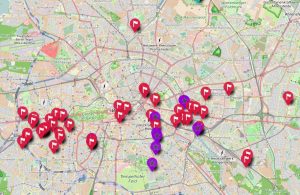November 25th is the “International Day for the Elimination of Gender-based Violence against Women”. On this day, we want to reflect on repression and gentrification from the perspective of gender, and invite people to participate in the demo from the Alliance of Internationalist Feminists at 18:00 in front of the Auswärtiges Amt (Berlin).
The State, as a patriarchal mechanism, has the objective of controlling all aspects of our lives. For this reason they aim to maintain and reproduce the established social order by repressing any kind of radical dissent outside of heternormative parameters. In order to carry out this task with a sufficient social consensus, a discourse is createdwhich endorses repression against what is considered “undesirable conduct”.The result is the dehumanization of those who resist, and legitimizion excessive violence against our bodies.We see this in the establishment of red zones, the control of demonstrations or gatherings, the use of police or laws such as §129,as well as in the eviction of Liebig34 which was accompanied by a massive campaign against those who were living there using patriarchal stereotypes, insults and threats. We see a queer-anarcha-feminist house being transformed into a projection of macho behaviour by cops and security guards.Liebig34, the autonomous youth centre Potse, the collective bar Meuterei, the Wagenplatz of Køpi and Rigaer94 are spaces which should belong to all of us, as not only are they places where we can express our political stances, they are places where we live and create social interactions. Nevertheless, places where we still are also fighting to be free of sexual violence and patriarchal structures.
Through these legislations against our different ways of living and resisting, the State positions itself as the guarantor of security, using mechanisms commonly associated with masculinity: force, control, aggressionand protection of private property. We also see this in the patriarchal militarized police structures that are used for the imposition ofsocial order, above all, in the public space. It is here, too, that the patriarchal nature of the State can be seen. Through public-private dualism, a binary hierarchy identified as “masculine-feminine” is created: “masculinity” is represented by the State, which controls the public space; and the “feminine” is represented by dissidence, which must be relegated to a private-invisible space. For this reason, in Germany and some European countries, “civic” laws exist that regulate the public space in a hierarchical way by regulating how, when and by whomit is used. This model of city also provokes the stigmatization and expulsion of certain people and social groups. These people are those that do not fit into the model of what is acceptable to the state: the poor, sex workers, undocumented migrants, those living on the streets. Although in Berlin there is a certain tolerance towards these communities, it always takes place in very concrete spaces regulated by heavy police violence, as we can see in Kottbuser Tor or Görlitzer Park.
State patriarchal-control is followed by a gentrification process that welcomes people with a privileged status. While there is an increase in private profit through the concentration of German and multinational companies, investment funds and banks,at the same time neighborhood commerce, bars where we can articulate our networks of mutual support,and projects where we can livea subversive life are eliminated. With this, there is a loss of multiple urban identities in favor of standardized and aseptic spaces which do not respond to the fundamental needs of the population, but promote consumerism and precarious employment. This whole process is accompanied by a displacement of sections of the population due to the increase of rents and evictions. The gender implications of this transformation are evident, not only becausethere is a gender pay gap of 20%, orthe feminization of poverty that affects women* directly, but also because those who manage to stay see how neighborhoodsand communities are being eroded, making daily activities more difficult. Places were trust relationships were established and managed to create safer spaces for women are now getting demolished in order to build start ups, yuppies centers, luxury buildings etc where all relationships are build in anonymity and not in trust, mutualaid and solidarity. And those who areforced to leave not only have to look for another house;relocationcan also mean changing schools and doctors and a general break with your social network amongst myriad other consequences. Those changesaffect our ways of socializing and walking in the street, where sexist violence is manifested, and this limits our use of the public space. In Berlin2 rapes are registered per day. Consequently, we find a model of city that prioritizes the market and abandons care.
Against any kind of oppression we stand together.Because solidarity is not enough, let’s build more resistance. Let’s be offensive feminists!
In solidarity with Lina, an antifascist arrested on the 5th of November in Leipzig!

